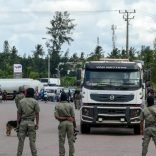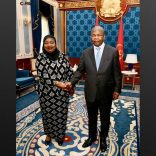Mozambique: State cuts spending, but salaries and debt continue to strain budget
Mozambique: Technical recession ‘largely explained by post-election protests,’ says government

File photo: Lusa
The Mozambican government estimates that 955 businesses were destroyed during the months of post-election violence, leaving 50,000 people unemployed, according to a document addressing the current challenge of preventing the economy from entering recession.
“The technical recession recorded in the last quarter of 2024 and the first two quarters of 2025 is largely explained by the post-election protests,” reads the Economic Recovery and Growth Plan (PRECE), noting that this period saw a “partial shutdown of the economy and mass layoffs.”
In the document, accessed by Lusa today, the government recalls that the country’s Gross Domestic Product (GDP) performance “shows a downward trend,” falling from “robust” growth of 5.58% in the third quarter of 2024 to -5.68% in the last quarter, reflecting the impact of the protests following the 9 October general elections.
“The first and second quarters of 2025 show a gradual economic recovery, with GDP growth rates of -3.92% and -0.94%, respectively—an improvement of 4.74 percentage points compared to the last quarter of 2024. This is a technical recession scenario and requires a strategic approach to prevent an economic recession,” the document continues.
It adds that “a survey conducted recorded the destruction of more than 955 economic and social establishments, which led to the unemployment of approximately 50,000 people” during the period of social unrest following the elections.
The government intends to mobilise US$2.75 billion in the short and medium term to stimulate the economy, particularly in response to the impacts of climate change and political instability, according to the PRECE, approved on 16 September by the Council of Ministers.
Mozambique experienced nearly five months of social tension, with demonstrations, strikes, and barricades in the streets of several cities, especially Maputo. The protests, initially sparked by rejection of the 9 October election results by former presidential candidate Venâncio Mondlane, escalated into violent clashes with police, resulting in around 400 deaths.
The unrest also led to the destruction and looting of public infrastructure and businesses, with an economic impact estimated at more than 32.2 billion meticais (€480 million), according to a February report from the Confederation of Economic Associations of Mozambique (CTA).
On 23 March, President Daniel Chapo met with Venâncio Mondlane for the first time. Both pledged to end the violence, which was eventually brought under control.












Leave a Reply
Be the First to Comment!
You must be logged in to post a comment.
You must be logged in to post a comment.